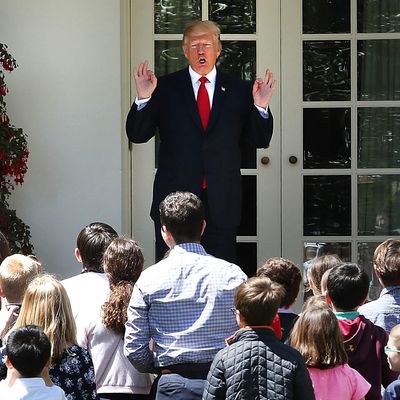
The Democratic Party’s core message in 2018 is simple: The Republican Party gave giant tax cuts to its superrich donors — and plans to pay for them by taking health care away from working people.
While the news media obsesses about connecting the dots between Donald Trump and Russia (and/or Trump and Stormy Daniels, and/or Trump and a wide array of potential white-collar crimes), Democratic candidates across the country are focused on drawing a bright line from the GOP’s deficit-financed tax giveaway to its (failed) attempt to repeal the Affordable Care Act. As Democratic consultant Jesse Ferguson explains in an interview with CNN’s Ronald Brownstein:
Most political professionals and journalists talk about “the health care repeal and the Trump tax plan as two different issues…The voters see them as ways Washington isn’t looking out for them. … On both of them, it’s basically the same: they [Congressional Republicans] have been giving tax breaks to health insurance companies, to pharmaceutical companies and those come at the expense of people who work for a living. It means higher health care costs, eventually higher taxes, more debt for your kids, and cuts to Social Security and Medicare as you get older.”
It’s not clear that a majority of voters currently see the GOP’s two major legislative initiatives as a single package — but it is clearly in the Democrats’ interest to promote that idea. By itself, Donald Trump’s signature legislative achievement remains the most unpopular tax cut in modern American history. But it still polls far better than the GOP’s attempt to throw millions of people off of their insurance did; and health care remains both one of the electorate’s top concerns, and an issue on which the public trusts Democrats more than Republicans. The more Democrats can get the public to see tax cuts as a prelude to health-care cuts, the better off they’ll be.
After all, only a small minority of GOP voters support their party’s full fiscal agenda: Most of the Republican base actually opposes tax cuts for the rich and corporations, and supports increased federal spending on health care. Granted, the substance of President Trump’s fiscal policies matter less to his core supporters than the vision of America (as a nation of the white Christian people, by the white Christian people, for the white Christian people) that he represents. But by appealing to working-class identity, and railing against health-care costs, Democrats just might be able to pick off some of Trump’s least-committed, white female supporters — which is to say, those who already have some identity-based ambivalence about the pussy-grabber-in-chief.
Finally, priming the electorate to associate rising health-care costs with the Republican Party’s fiscal treachery could help Democrats fully capitalize on a small piece of karmic justice: Thanks to the Trump administration’s myriad attempts to sabotage the Affordable Care Act, insurance companies are poised to announce premium hikes just before November’s elections.
Still, some Republican strategists are not worried: the GOP’s attempt to repeal Obamacare was approximately 10 trillion news-cycles ago, and anyway, that bill didn’t pass; Republicans shouldn’t have much trouble keeping swing voters focused on the thriving economy, so long as they don’t go out of their way to draw attention to their austerity agenda between now and November.
Alas, President Trump is about to do just that:
President Trump is sending a plan to Congress that calls for stripping more than $15 billion in previously approved spending, with the hope that it will temper conservative angst over ballooning budget deficits.
Almost half of the proposed cuts would come from two accounts within the Children’s Health Insurance Program (CHIP) that White House officials said expired last year or are not expected to be drawn upon.
In total, the White House is proposing $7 billion in cuts to CHIP. It appears to be true that $5 billion of that sum is currently trapped in an account that can’t be legally accessed — but that doesn’t oblige Congress to eliminate the funding, as opposed to merely passing legislation to make the account legally accessible. The other $2 billion would come out of the Child Enrollment Contingency Fund, which guarantees that state-level CHIP programs will have access to extra funds, should enrollment come in higher than expected. Since CHIP is targeted at children from low-income families — and the economy is strong — it is unlikely that enrollment will come in unusually high this year. But then, economic conditions can change.
Regardless of the fine details, Trump’s proposal offers Democrats a perfect headline: After digging a $1.5 trillion hole in the deficit with tax cuts for the rich, the president and his party are now demanding reductions in federal spending on health care for poor children.
As a political matter, the plan is indefensible; and yet, Trump is ostensibly putting it forward purely for politics’ sake. The federal deficit is expected to grow from $665 billion last year to $804 billion in 2018; cutting $15 billion off the latter sum isn’t going to make any significant difference in the nation’s fiscal health. And anyhow, the package appears to be dead on arrival in the Senate, where John McCain remains sidelined by terminal brain cancer, and Susan Collins has already signaled opposition to CHIP cuts.
Thus, Trump’s proposal is a symbolic gesture that doesn’t actually advance the conservative movement’s substantive goals — but does undermine its electoral prospects. It’s a move driven by a desire to appease the Republican Party’s far-right flank, a contingent so tightly ensconced in its epistemic bubble it cannot recognize the strategic incoherence of its demands. Sometimes Trump’s fealty to that faction and its worldview leads to diplomatic blunders of historic proportions; other times, it merely results in what is, essentially, an in-kind contribution to the Democratic Party.






























